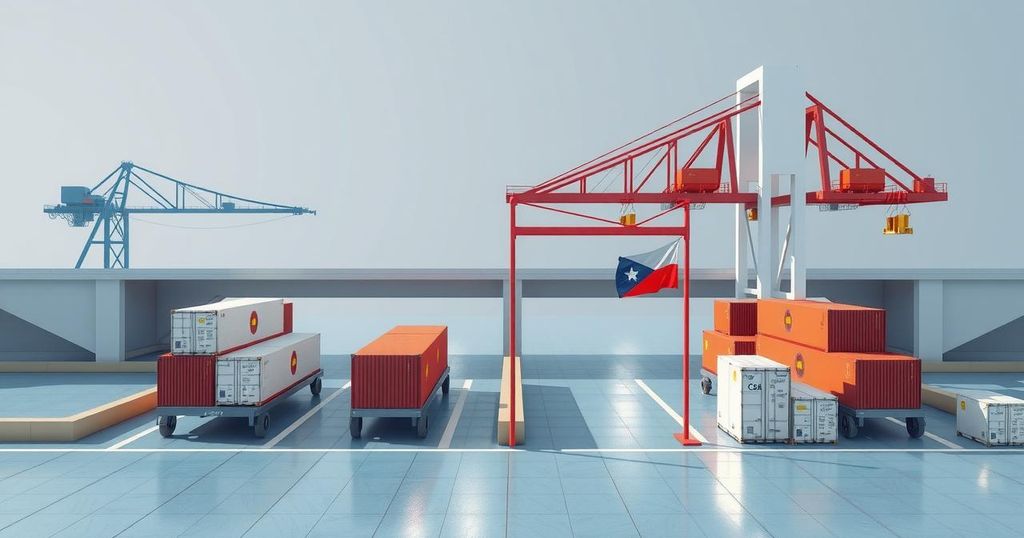President Trump has temporarily halted tariffs on Mexico and Canada as federal officials raise inflation concerns; the freeze on aid has left South Africa’s health program in uncertainty. EU officials advocate for dialogue with the U.S. Meanwhile, Secretary of State Rubio emphasizes border security and migration cooperation in Latin America.
In a recent development, President Donald Trump has temporarily paused tariffs on imports from Mexico and Canada, providing a brief relief amidst the ongoing scrutiny of Elon Musk’s role in significant government changes. The European Union leaders convened to address Trump’s tariffs, advocating for constructive dialogue while prepared to respond to perceived unfairness. European Commission President Ursula von der Leyen emphasized that EU is ready to act if the U.S. imposes unjust tariffs.
Several Federal Reserve officials have expressed concerns regarding the inflation risks associated with Trump’s proposed trade tariffs. Susan Collins, President of the Federal Reserve Bank of Boston, indicated that broad tariffs are likely to increase prices on both final and intermediate goods. Similarly, Austan Goolsbee, President of the Federal Reserve Bank of Chicago, stated that ambiguity around tariffs necessitates a cautious approach to interest rate reductions, as inflation may rise unexpectedly.
South African Health Minister Aaron Motsoaledi called the U.S. freeze on foreign aid baffling, particularly amid the negative impacts on AIDS treatment programs. Despite Secretary of State Marco Rubio claiming that critical programs would remain funded, reports indicate that many clinics have denied services due to the aid suspension. Notably, PEPFAR funding, which is essential for South Africa’s HIV/AIDS initiatives, has faced interruptions due to this freeze.
U.S. District Judge Loren L. AliKhan has upheld an order pausing the Trump administration’s plan to freeze substantial federal spending. Nonprofit organizations have reported gaining access to previously promised funds, despite the administration’s reversal on directives. AliKhan noted that the impending harms from the funding freeze could have serious repercussions for various communities.
Amidst rising energy prices and market changes, it is observed that Trump achieved his desired border security improvements without imposing tariffs. Canadian authorities have committed a considerable financial investment to enhance border security technology, a response seemingly welcomed by the Trump administration. With the tariffs currently on hold, analysts describe this trade conflict as a significant pause in what has been labeled as “the dumbest trade war in history.”
Secretary of State Marco Rubio concluded his visit to Panama with an emphasis on collaboration to manage migration issues. The situation in the region remains complicated, with discussions of potential projects aimed at managing deportations while addressing security concerns. However, Rubio did not comment on the implications of alleged Chinese influence in the region, particularly concerning the Panama Canal.
The article covers the recent developments regarding U.S. trade tariffs directed at Mexico and Canada, highlighting the broader implications for U.S. economic policy and international relations. It discusses the viewpoints of key officials from the Federal Reserve concerning potential inflation risks associated with these tariffs. Additionally, the impact of U.S. aid freezes on vital health programs in South Africa is noted, alongside responses from local authorities and implications for recipients. The article also addresses U.S. border security enhancements and regional immigration cooperation initiatives initiated by Secretary of State Marco Rubio.
In summary, President Trump’s pause on tariffs against Mexico and Canada signals a brief reprieve amidst ongoing scrutiny regarding inflation and foreign aid implications. Federal Reserve officials express the need for caution given potential price increases from tariffs. The freeze on U.S. aid raises concerns in health sectors, particularly regarding HIV/AIDS treatment in South Africa. Overall, the geopolitical landscape remains fluid as the administration navigates complex trade relationships and security cooperation efforts.
Original Source: www.aljazeera.com




